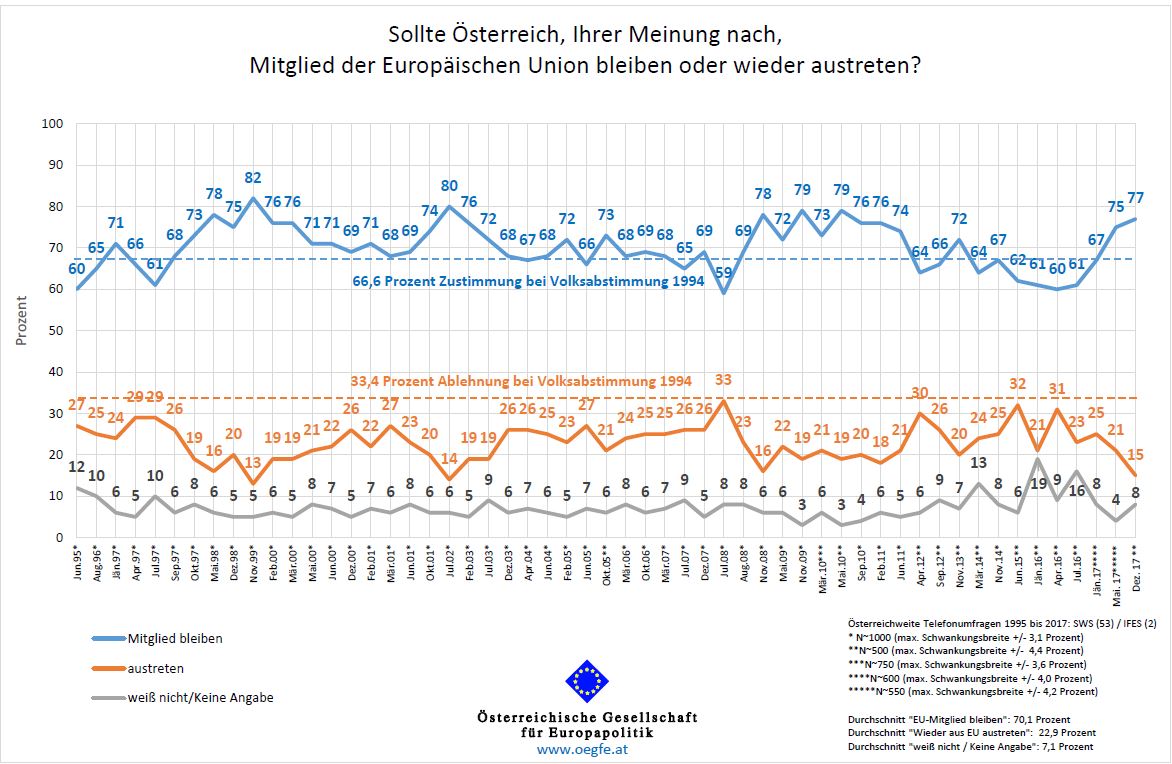Seit der Brexit-Abstimmung und den US-Wahlen ist die Zustimmung der Österreicherinnen und Österreicher zur EU-Mitgliedschaft deutlich gestiegen. Zu diesem Ergebnis kommt eine aktuelle österreichweite Umfrage der Österreichischen Gesellschaft für Europapolitik (ÖGfE).
77 Prozent der befragten ÖsterreicherInnen sprechen sich dafür aus, dass unser Land Mitglied der EU bleibt. 15 Prozent plädieren für einen Austritt aus der Union. 8 Prozent beziehen keine Stellung.
Seit April 2016 ist die Zahl der Mitgliedschaftsbefürworter kontinuierlich – um 17 Prozentpunkte – gestiegen. Gleichzeitig hat sich die Zahl jener, die einen EU-Austritt befürworten, um die Hälfte verringert (April 2016: 60 Prozent „Österreich soll EU-Mitglied bleiben“ | 31 Prozent: „Österreich soll aus EU austreten“).
Insgesamt 55 österreichweite ÖGfE-Befragungen seit Juni 1995 zeigen, dass – trotz Schwankungen – die BefürworterInnen der EU-Mitgliedschaft stets in der Mehrheit waren. Im Durchschnitt lag ihre Zahl bei rund 70 Prozent, die Zahl jener, die sich für den EU-Austritt aussprachen, dagegen bei 23 Prozent. Die höchste Zustimmung zur EU-Mitgliedschaft fand sich im Juni/Juli 2002 (80 Prozent), der stärkste Wunsch nach einem Austritt im Juni/Juli 2008 (33 Prozent).
Insgesamt 55 österreichweite ÖGfE-Befragungen seit Juni 1995 zeigen, dass – trotz Schwankungen – die BefürworterInnen der EU-Mitgliedschaft stets in der Mehrheit waren. Im Durchschnitt lag ihre Zahl bei rund 70 Prozent, die Zahl jener, die sich für den EU-Austritt aussprachen, dagegen bei 23 Prozent. Die höchste Zustimmung zur EU-Mitgliedschaft fand sich im Juni/Juli 2002 (80 Prozent), der stärkste Wunsch nach einem Austritt im Juni/Juli 2008 (33 Prozent).
Die Umfrage wurde von der Sozialwissenschaftlichen Studiengesellschaft vom 16. November bis 5. Dezember 2017 im Auftrag der ÖGfE durchgeführt (Tel SWS 268). Befragt wurden österreichweit 512 Personen per Telefon (repräsentativ für die österreichische Bevölkerung ab 18 Jahre/Gewichtung nach Geschlecht, Alter und Bildung). Maximale Schwankungsbreite ca. +/- 4,3 Prozent. Differenz auf 100 Prozent aufgrund gerundeter Werte.
Hintergrund: Die Umfrage wurde als Teil des Projekts „Anti EU-rhetoric versus own national interests? National populism and its reception in Central Europe” im Rahmen des Europa für Bürgerinnen und Bürger Programms der Europäischen Union durchgeführt.
Weitere interessante Artikel
23. Juli 2024
Krone TV “Nachgefragt”: Wichtige Wahl für EU – Harris gegen Trump
Paul Schmidt spricht im Krone TV-Interview über die Bedeutung des US-Wahlkampfs für die EU, die Sicht der Europäischen Union auf Ungarns aktuelle Ratspräsidentschaft und die Prioritäten der wiedergewählten Ursula von der Leyen.
22. Juli 2024
Puls24 NEWS: EU-Parlament kommt erstmals seit Wahl zusammen
Paul Schmidt, Generalsekretär der österreichischen Gesellschaft für Europapolitik, spricht im Puls24 NEWS Interview über die erste Sitzung des EU-Parlaments nach der EU-Wahl im Juni. Als mögliche Themen werden die Neubesetzung zahlreicher Spitzenjobs und der Ratsvorsitz Ungarns erwartet.
11. Juli 2024
The European Union in Search of Its Own Mythology
By: Olena Pokotilo
The attractiveness of the European Union is based on its economic and social model as well as on its manifold national cultural heritage. Throughout the post-Cold War period, the EU has not actively promoted pan-European myths and struggles today with creating a cohesive and credible common narrative. In this context, the author of this Policy Brief argues that to maintain its unity amidst global instability and evolving political landscapes, the EU must develop new, meaningful myths. She discusses the characteristics of the myth-design of the Union and offers policy recommendations.
The attractiveness of the European Union is based on its economic and social model as well as on its manifold national cultural heritage. Throughout the post-Cold War period, the EU has not actively promoted pan-European myths and struggles today with creating a cohesive and credible common narrative. In this context, the author of this Policy Brief argues that to maintain its unity amidst global instability and evolving political landscapes, the EU must develop new, meaningful myths. She discusses the characteristics of the myth-design of the Union and offers policy recommendations.
Neueste Beiträge
Weitere interessante Artikel
23. Juli 2024
Krone TV “Nachgefragt”: Wichtige Wahl für EU – Harris gegen Trump
Paul Schmidt spricht im Krone TV-Interview über die Bedeutung des US-Wahlkampfs für die EU, die Sicht der Europäischen Union auf Ungarns aktuelle Ratspräsidentschaft und die Prioritäten der wiedergewählten Ursula von der Leyen.
22. Juli 2024
Puls24 NEWS: EU-Parlament kommt erstmals seit Wahl zusammen
Paul Schmidt, Generalsekretär der österreichischen Gesellschaft für Europapolitik, spricht im Puls24 NEWS Interview über die erste Sitzung des EU-Parlaments nach der EU-Wahl im Juni. Als mögliche Themen werden die Neubesetzung zahlreicher Spitzenjobs und der Ratsvorsitz Ungarns erwartet.
11. Juli 2024
The European Union in Search of Its Own Mythology
By: Olena Pokotilo
The attractiveness of the European Union is based on its economic and social model as well as on its manifold national cultural heritage. Throughout the post-Cold War period, the EU has not actively promoted pan-European myths and struggles today with creating a cohesive and credible common narrative. In this context, the author of this Policy Brief argues that to maintain its unity amidst global instability and evolving political landscapes, the EU must develop new, meaningful myths. She discusses the characteristics of the myth-design of the Union and offers policy recommendations.
The attractiveness of the European Union is based on its economic and social model as well as on its manifold national cultural heritage. Throughout the post-Cold War period, the EU has not actively promoted pan-European myths and struggles today with creating a cohesive and credible common narrative. In this context, the author of this Policy Brief argues that to maintain its unity amidst global instability and evolving political landscapes, the EU must develop new, meaningful myths. She discusses the characteristics of the myth-design of the Union and offers policy recommendations.






